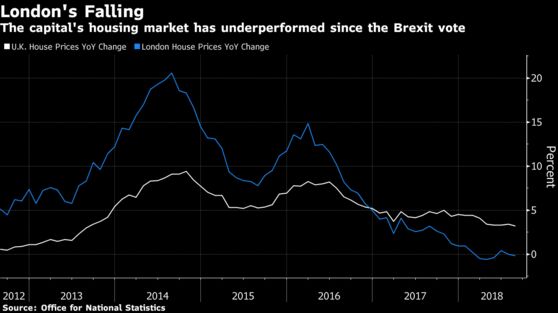By Anurag Kotoky
The London housing market is in bad shape -- possibly even worse than it looks on paper.
Official numbers show that prices in the capital only started to fall this year. But it feels much more brutal to real-estate agents on the ground.
James Hyman, head of the residential agency division at Cluttons, has been in the business for two decades and knows how to read the signs. The market is already down about 15 percent in central London compared with four years ago and, in his view, it may fall another 7 percent in the next year and half.

For Hyman and other realtors -- not to mention home sellers -- the list of market challenges has grown in recent years. The slowdown, triggered by a slew of new taxes and stretched affordability, has been compounded by Britain’s impending exit from the European Union, and now there’s the threat of a new levy on foreign buyers.
That’s a lot of uncertainty to deal with when you’re looking to fork out 486,000 pounds ($633,000), the average London home price -- or far more, if you’re close to the center.
The real problem is all those years of skyrocketing prices. Even with the current weakness, only a third of young adults can afford to buy a house in London on a 10 percent deposit and a maximum mortgage of 4 1/2 times their salaries, according to the Institute for Fiscal Studies.
And the cost of the average London residence is almost 14 times the median full-time salary in the city.
For its part, Brexit has put off overseas buyers, reducing demand by as much as 70 percent from 2014 levels, according to Hyman.
“Brexit was the absolute final reason why the property market in London would come to a slide down,” he said in an interview. “This is about affordability.”
To help people get on the property ladder, the government tried to crack down on equity-rich homeowners buying up property to rent out. It increased sales tax on second-home purchases and changed the tax relief for mortgage interest on rental homes.
On top of that, it announced this month plans to impose higher taxes on foreigners looking to buy property in the U.K., impacting roughly half of all residential transactions in central London.
Those changes took the steam out of the market, which has long been buffeted by a shortage of homes. Brexit came as the final nail in the coffin, according to Aneisha Beveridge, a housing market analyst at Hamptons International & Countrywide Plc.
While prices may have already bottomed in prime central London, Brexit is preventing them from picking up, she said in an interview.
Diverse Capital
The picture in the capital varies widely in different neighborhoods. A report from LSL Property Services and Acadata last week showed prices fell in 21 of 33 boroughs from a year earlier in August, with Tower Hamlets seeing a near 10 percent drop and Greenwich, Westminster and Wandsworth seeing falls of around 9 percent.
While the expensive but volatile City of London and Kensington and Chelsea saw the biggest increases, areas of on the fringes of the capital such as Waltham Forest, Brent and Redbridge also showed gains.
Prime Minister Theresa May is inching toward a deal with EU counterparts before the U.K. formally exits the bloc in March. Hopes of reaching an agreement this month have been dashed as a series of summits failed to deliver.
“While a Brexit resolution will remove some of the uncertainty weighing on London house prices, the capital faces an affordability crisis," said Niraj Shah, a London-based economist at Bloomberg Economics. “Add to that the tax changes to the buy-to-let sector as well as proposed higher stamp duty on foreign buyers and the London housing market is likely to remain subdued for some while yet."
No comments:
Post a Comment